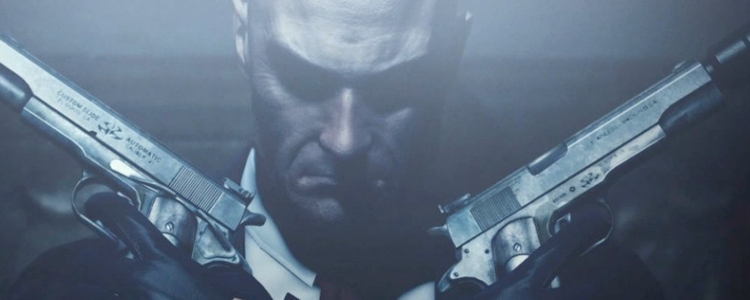Hitman: Absolution is a wickedly smart, darkly enjoyable video game, one that's as generous to players as its protagonist is merciless to his victims. You'll stab, strangle and shoot your way through level after level, sometimes grimacing, sometimes scowling, sometimes laughing. When all is said and done, you'll probably need a shower.
To play Absolution is to view the world through the eyes of a psychopath, a remorseless killer who snuffs out life with the the efficiency, precision and emotion of a fine German automobile. Just about everyone in this grotesque place is in need of a good killing, and hawk-faced murder machine Agent 47 is the man for the job.
Absolution picks up the Hitman story where the last game in the series, 2006's Blood Money, left off. Let's pause before we talk about the story: Yes, the last Hitman game was released more than half a decade ago. That's a long time between sequels, even in the relatively slow-moving video game world. But that extended time in development likely accounts for a lot of what makes Hitman such a sprawling, interesting game.
Absolution keeps consistent with the general setup of past Hitman games: At the start of a level, 47 is given a target, and he must make his way through the level by any of a number of possible routes, eventually cornering and eliminating his target. When you think about it, that's not so fundamentally different from most games---there's a boss, and you must make your way through a level in order to take him down.
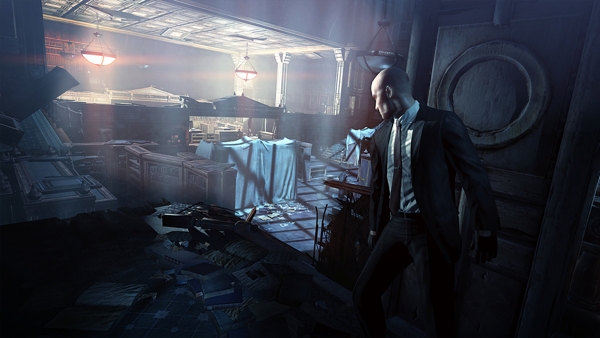
The key difference, then, lies in the many paths Hitman allows players to take to success. Each level is a mini-sandbox that begins at a default state, where any hostile characters are unaware of 47's presence, and he has some freedom to sneak (or just walk) around and get the lay of the land. A city courthouse, a bustling Chinatown fireworks show, or a run-down, flooded hotel---each one presents a unique set of obstacles between the player and his or her target.
Hitman: Absolution
Developer: IO Interactive
Platforms: Xbox 360, PS3, PC (Reviewed)
Release Date: November 20
Type of game: Violent, pulpy stealth game centered around sneakily assassinating lots of very bad people.
What I played: Completed the single-player in about 21 hours, played a few more hours of single-player on a higher difficulty, and a couple hours of contracts mode.
My Two Favorite Things
- Pulling off a miraculous escape thanks to panicked improvisation.
- Contracts mode is a smart success, a clever way to get the most out of the game's large levels.
My Two Least-Favorite Things
- Cheap gay jokes and lazy misogyny mar an otherwise enjoyable script.
- The game's only real "boss" encounter is a weird quicktime event that should've been cut.
Made-to-Order Back-of-Box Quotes
- "They'll never see me coming in this chicken suit."
-Kirk Hamilton, Kotaku.com - "Someone farted, and Hitman smells it. He will deal with whoever dealt it."
-Kirk Hamilton, Kotaku.com - "I killed a guy with a bong. No, like, I kiled him with the bong."
-Kirk Hamilton, Kotaku.com
The thrill of Hitman is that it offers so much freedom. There can be as many as a dozen possible ways to assassinate a target, and few things are more satisfying than getting away with an assassination unseen, particularly if luck and improvisation were involved. (They frequently are.) Hitman diehards, a sadistic coalition of which I consider myself a member, have nothing to fear from Absolution. The game embraces the hardcore, open-ended aspects of the series---Blood Money in particular---with welcomely anachronistic aplomb.
After several years of ever-shortening AAA game-lengths, Absolution feels massive, almost humorously generous. The story begins in Chicago (more games set in Chicago please!), leaping from a posh lakeside manor to a seedy hotel to a breathless The Fugitive-style police chase all over the nooks and crannies of the city. It then hops to rural South Dakota, where the levels get even wilder---a swinicidal weapons-testing lab, a crowded city courthouse, small-town streets, a mob BBQ, and so many more. Several chapters in the story are set in fully realized areas that see maybe 10 minutes of action---they're only there to enhance the atmosphere and further the plot. In this age of streamlined game design, Hitman: Absolution frequently feels like an indulgence. It's a welcome one.
The story is pure b-movie hogwash that involves 47 turning on his employers to protect a young girl who may be a genetically engineered supersoldier like him, capable of great and terrible power. (She may even be bald like he is: That sure looks like a wig, anyway.) The narrative is never more than an excuse to let our anti-hero garrote his way through exotic locations, one stashed body at a time.
The world of Hitman: Absolution is a right nasty one, and often it feels like the game's trying too hard. This is a dark place, where men are pigs with sex-offender eyes and women are either scantily clad wank fantasies, psycho killers, nuns, prostitutes, or some combination of the four. 47 is his usual fart-smell-faced cypher self, but the young girl he's protecting could have easily been so cool---part Hit-Girl and part Mitsuko Souma, a killing machine in a schoolgirl dress. And yet she's relegated to the role of helpless MacGuffin for all but a brief, stilted cutscene. It feels like a waste.
Aspects of Absolution channel the instagram-filtered funk of HBO's smutty vampire series True Blood, but the game has little of that show's hedonistic joy. Once you look past the blood and tits, Absolution often feels cold, calculated, and vaguely creepy. The leather-gloved choking, S&M fixation and light, doth-protest-to-much homophobia evoke European torture-porn more than they do southern-fried pulp. As I played, I couldn't quite shake the feeling that behind the awesome kills and brazenly sexualized violence lay a clinical, heavy-lidded observer who, having designed this funhouse, finds it enjoyable in a different, darker way than I do.
It feels appropriate, too, that a good deal of Absolution's story involves a man named Dexter. Agent 47, with his sociopathic tendencies and effortless ability to rack up a body count, stands right next to the secretly psychotic protagonist of Showtime's long-running serial killer series. Both Dexter Morgan and Agent 47 get a pass for the awful things they do, largely because they do those things to bad, bad people. But while Dexter smartly toys with the morality of the thing, teasing at the humanity of its monster of a main character, Hitman blithely embraces darkness with next-to-no subtext or ambiguity.

That's not to say that the writing is bad, just inconsistent. In fact, the dialogue is frequently spirited and well-performed. At its strongest, Absolution feels like a gritty modern-day Western, with 47 re-imagined as a taciturn frontier anti-hero: A man in black, walking toward a church, holding a pistol. TV fans will likely pick out the voices of Deadwood alums Powers Boothe and Keith Carradine, Boothe purring his way through an otherwise overblown role and Carradine lending a sinister glint to a ridiculous cornpone killer.
Many of the levels are jammed with shoulder-to-shoulder civilians, and Hitman: Absolution sports some of the most convincing, enjoyable crowds I've encountered in a game. Those crowds are greatly enhanced by some wonderfully written ambient dialogue---these writers know exactly how to capture the rhythm of a one-sided cell-phone conversation, to the point that I stopped evading the cops in a crowded Chicago train station just to sit back and listen. Playing Absolution so soon after Assassin's Creed III is a lesson in how crowd-stealth should feel, and how to believably render the chaos of a dense urban scene.
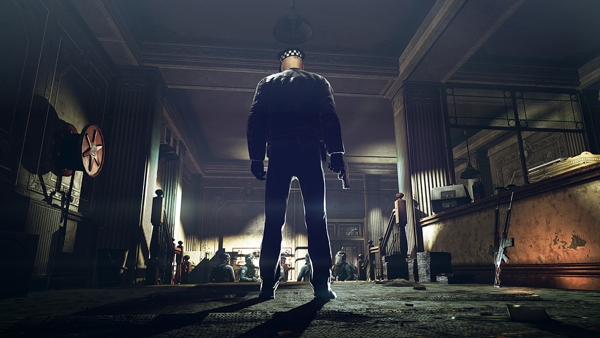
If you can get around the story's squickier edges (as I was able to), you're in for a hell of a good time. This game takes everything that worked in Blood Money and makes it work better, while adding more-complex artificial intelligence, easier-to-use tools, and new mechanics smartly borrowed from other stealth games.
Absolution feels like a gritty modern-day Western, with 47 re-imagined as a taciturn frontier anti-hero: A man in black, walking toward a church, holding a pistol.
Absolution gives players a great deal of credit, and you're free to approach any situation any way you like. In one level, you're tasked with killing three doctors in a research wing. You could head in guns blazing and take them down (theoretically, of course---outright combat is improved from past Hitman games, but remains looser and less satisfying than stealth). You could also lure them into a dark area, kill them, and stash their bodies. Or, best of all, you could take advantage of the environment to lay any of a number of unique traps for them, making each death look like an accident before walking out unscathed.
The most deadly tools in 47's arsenal isn't his trademark Silverballer pistols, they're his outfits. Hitman games are all about dress-up: Choke out or kill a guard or a scientist and you can quickly don his outfit and fool anyone who isn't wearing the same outfit. (For example: Put on a guard's outfit and other guards will see through it, but construction workers won't. Vice-versa if you put on a construction worker's outfit. This makes rare and unique outfits more valuable.) The costumery makes the game much more reactive and fun than it would've been as a pure stealth game. It also appeals to my inner collector---most every level has at least one bizarre unique costume that, if unlocked, can make 47 difficult to spot AND funny-looking.
Absolution is very much a "video game," if that makes sense. It requires a good deal of suspension of disbelief, but in this case that's a good, often great thing. The artificial intelligence is flexible and a lot of fun to square off against, but it's still obviously artificial. The systems are all transparent, and the game goes to great lengths to make sure you understand each one. That means that on normal difficulty, you can kill a guy, be spotted, then hide for a minute, and everyone will go back to their regular daily deal without, you know, freaking out about the fact that their co-worker is lying dead right there. The costumes, too, never feel all that believable: Yes, a 6'3" bald man with a sliced barcode on the back of his head is lumbering, hawk-eyed, through a group of guys who presumably work alongside the dude whose clothes he's wearing. Nope, no one notices. But it makes the game work, and it's a lot of fun, so who cares?
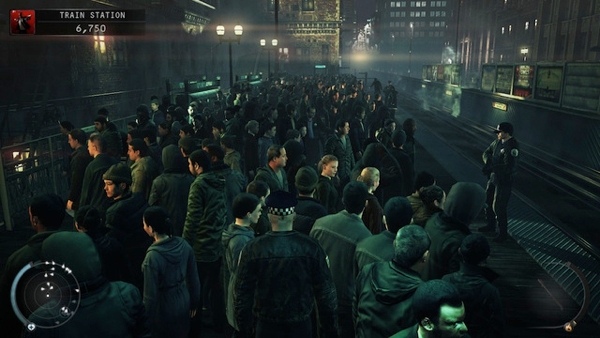
As I mentioned earlier, Hitman: Absolution borrows smartly from several other big stealth games. The biggest lift is 47's "Instinct" ability, which is accessed using the right shoulder button. It operates similarly to Batman's detective mode in Arkham City, and is perhaps even closer to Adam Jensen's see-through-walls augmentation in Deus Ex: Human Revolution. With instinct, enemy characters light up gold, even through walls, and players are therefore able to plan out strategies on the fly with a much greater chance of success. Thankfully, instinct doesn't make the game too easy---it just makes it more fun. And, if you're a true purist, you can turn it off on the highest difficulty.
With instinct activated, trails of fire will appear in front of enemies to indicate the path they'll be following. In one level, I was stuck crouching just out of a guard's line of sight when suddenly, a path of flame lit up right next to me. I could see the other guard coming up the stairs to enter the room, and he'd be upon me in seconds. I had to act fast, so I quickly stood up, ducked my way past the nearer guard and into a packed lobby before blindly choosing a door and BARELY making it to safety. It was a real thrill.
Hitman: Absolution is another game that inspires stories, where you'll debrief with your friends to figure out how they accomplished different goals, and what wild things happened along the way. Each area has a number of assigned "challenges" that show a picture, or a name, along with a cryptic hint about what you're supposed to do. It's a smart, subtle way of encouraging you to plumb each level's depths without giving away too much of what you're supposed to do (e.g. there's a "master poisoner" challenge that lets you know that poisoning is possible without telling you what to do). Completing challenges nets you experience that unlocks new, upgraded abilities, though to be honest I never really felt the impact of any of these upgrades in the game. As with the past games, a perfect "Silent Assassin" score is a reward unto itself, and dedicated players will have hours of fun dissecting the many areas and figuring out how best to exploit their nooks and crannies.
While Absolution doesn't come with versus multiplayer, it does come with a very smart asynchronous online component that will likely greatly enhance its lifespan. Called "Contracts" mode, it allows players to use the existing levels to devise their own assassination challenges, targets, and constraints, and see if other players can pull them off. It's a great idea, and well-executed. After all, the magic of Absolution lies in the malleable AI and the sprawling, multi-tiered levels. As I played through the story campaign, I couldn't help but feel like I was missing a huge chunk of each level as I went. Contracts mode greatly mitigates that feeling.
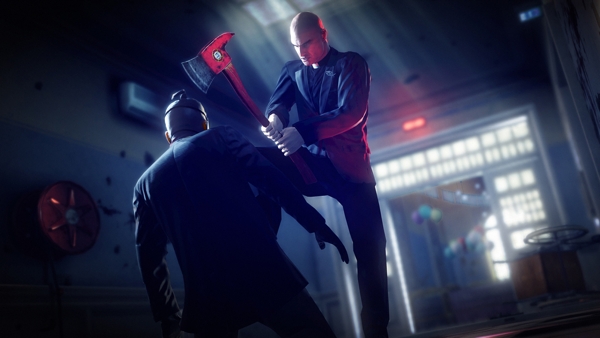
Creating a contract is a good deal of fun, too---you can't make a contract unless you yourself can pull it off. That means you'll start the level, with all of the AIs set in motion, and then kill any non-civilian character in any way you see fit. The game will then record what you did, how you did it, and what you were wearing. If you, say, kill a cook, hide his body, and make it out undetected, the contract you create will use those circumstances to award bonus points. You can also directly challenge your friends to beat your contracts, which will doubtless keep a lot of Hitman players coming back well past their first playthrough.
When it gets cooking, Hitman: Absolution evokes the feeling of a deadly, measured dance. It's a constant tango between you and the computer, with each party alternately taking the lead through arenas that constantly shift, re-set, and upset expectations. It's outsized and ambitious, drunk with freedom; vulgar, offensive, yet clever and respectful.
A world this rotten, this far beyond redemption, could do with a little killing. Who better to do it than you?
Republished with permission. Kirk Hamilton is a contributing editor at Kotaku.
